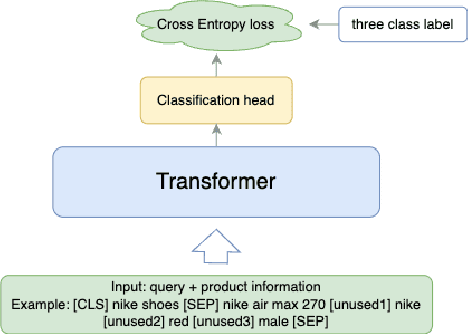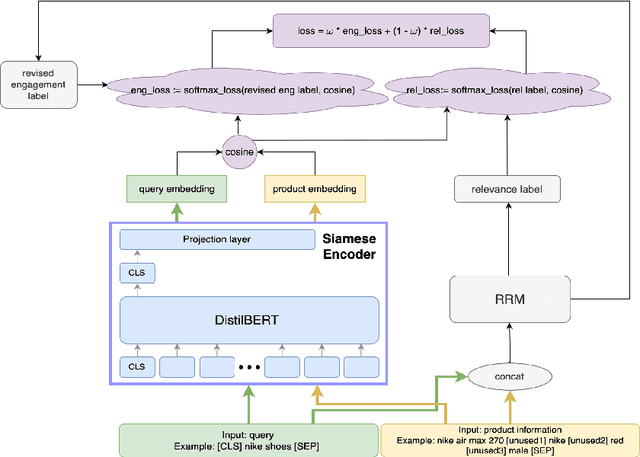Ciya Liao
Semantic Retrieval at Walmart
Dec 05, 2024



Abstract:In product search, the retrieval of candidate products before re-ranking is more critical and challenging than other search like web search, especially for tail queries, which have a complex and specific search intent. In this paper, we present a hybrid system for e-commerce search deployed at Walmart that combines traditional inverted index and embedding-based neural retrieval to better answer user tail queries. Our system significantly improved the relevance of the search engine, measured by both offline and online evaluations. The improvements were achieved through a combination of different approaches. We present a new technique to train the neural model at scale. and describe how the system was deployed in production with little impact on response time. We highlight multiple learnings and practical tricks that were used in the deployment of this system.
Relevance Filtering for Embedding-based Retrieval
Aug 09, 2024



Abstract:In embedding-based retrieval, Approximate Nearest Neighbor (ANN) search enables efficient retrieval of similar items from large-scale datasets. While maximizing recall of relevant items is usually the goal of retrieval systems, a low precision may lead to a poor search experience. Unlike lexical retrieval, which inherently limits the size of the retrieved set through keyword matching, dense retrieval via ANN search has no natural cutoff. Moreover, the cosine similarity scores of embedding vectors are often optimized via contrastive or ranking losses, which make them difficult to interpret. Consequently, relying on top-K or cosine-similarity cutoff is often insufficient to filter out irrelevant results effectively. This issue is prominent in product search, where the number of relevant products is often small. This paper introduces a novel relevance filtering component (called "Cosine Adapter") for embedding-based retrieval to address this challenge. Our approach maps raw cosine similarity scores to interpretable scores using a query-dependent mapping function. We then apply a global threshold on the mapped scores to filter out irrelevant results. We are able to significantly increase the precision of the retrieved set, at the expense of a small loss of recall. The effectiveness of our approach is demonstrated through experiments on both public MS MARCO dataset and internal Walmart product search data. Furthermore, online A/B testing on the Walmart site validates the practical value of our approach in real-world e-commerce settings.
Enhancing Relevance of Embedding-based Retrieval at Walmart
Aug 09, 2024



Abstract:Embedding-based neural retrieval (EBR) is an effective search retrieval method in product search for tackling the vocabulary gap between customer search queries and products. The initial launch of our EBR system at Walmart yielded significant gains in relevance and add-to-cart rates [1]. However, despite EBR generally retrieving more relevant products for reranking, we have observed numerous instances of relevance degradation. Enhancing retrieval performance is crucial, as it directly influences product reranking and affects the customer shopping experience. Factors contributing to these degradations include false positives/negatives in the training data and the inability to handle query misspellings. To address these issues, we present several approaches to further strengthen the capabilities of our EBR model in terms of retrieval relevance. We introduce a Relevance Reward Model (RRM) based on human relevance feedback. We utilize RRM to remove noise from the training data and distill it into our EBR model through a multi-objective loss. In addition, we present the techniques to increase the performance of our EBR model, such as typo-aware training, and semi-positive generation. The effectiveness of our EBR is demonstrated through offline relevance evaluation, online AB tests, and successful deployments to live production. [1] Alessandro Magnani, Feng Liu, Suthee Chaidaroon, Sachin Yadav, Praveen Reddy Suram, Ajit Puthenputhussery, Sijie Chen, Min Xie, Anirudh Kashi, Tony Lee, et al. 2022. Semantic retrieval at walmart. In Proceedings of the 28th ACM SIGKDD Conference on Knowledge Discovery and Data Mining. 3495-3503.
Large Language Models for Relevance Judgment in Product Search
Jun 01, 2024Abstract:High relevance of retrieved and re-ranked items to the search query is the cornerstone of successful product search, yet measuring relevance of items to queries is one of the most challenging tasks in product information retrieval, and quality of product search is highly influenced by the precision and scale of available relevance-labelled data. In this paper, we present an array of techniques for leveraging Large Language Models (LLMs) for automating the relevance judgment of query-item pairs (QIPs) at scale. Using a unique dataset of multi-million QIPs, annotated by human evaluators, we test and optimize hyper parameters for finetuning billion-parameter LLMs with and without Low Rank Adaption (LoRA), as well as various modes of item attribute concatenation and prompting in LLM finetuning, and consider trade offs in item attribute inclusion for quality of relevance predictions. We demonstrate considerable improvement over baselines of prior generations of LLMs, as well as off-the-shelf models, towards relevance annotations on par with the human relevance evaluators. Our findings have immediate implications for the growing field of relevance judgment automation in product search.
A Multi-task Learning Framework for Product Ranking with BERT
Feb 10, 2022



Abstract:Product ranking is a crucial component for many e-commerce services. One of the major challenges in product search is the vocabulary mismatch between query and products, which may be a larger vocabulary gap problem compared to other information retrieval domains. While there is a growing collection of neural learning to match methods aimed specifically at overcoming this issue, they do not leverage the recent advances of large language models for product search. On the other hand, product ranking often deals with multiple types of engagement signals such as clicks, add-to-cart, and purchases, while most of the existing works are focused on optimizing one single metric such as click-through rate, which may suffer from data sparsity. In this work, we propose a novel end-to-end multi-task learning framework for product ranking with BERT to address the above challenges. The proposed model utilizes domain-specific BERT with fine-tuning to bridge the vocabulary gap and employs multi-task learning to optimize multiple objectives simultaneously, which yields a general end-to-end learning framework for product search. We conduct a set of comprehensive experiments on a real-world e-commerce dataset and demonstrate significant improvement of the proposed approach over the state-of-the-art baseline methods.
 Add to Chrome
Add to Chrome Add to Firefox
Add to Firefox Add to Edge
Add to Edge